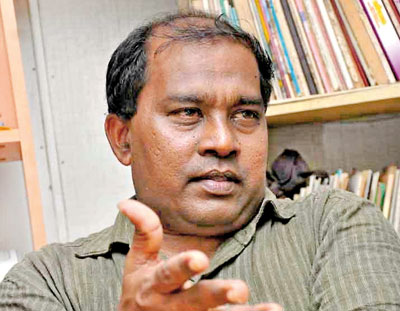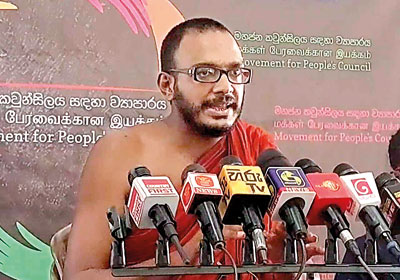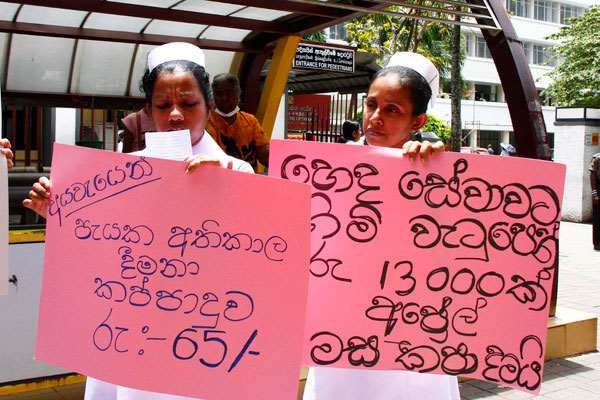News
Trade unions ‘extremely dissatisfied’ over public sector salary revision
View(s):By Tharushi Weerasinghe
Earlier this week, the Ministry of Public Administration issued a circular revising public sector employee salaries following the passing of the 2025 Budget. Many trade unions, some of which initiated strike action against some of the allocations made public during the Budget’s first reading, claim they are extremely dissatisfied with the changes brought about by the NPP government.
“The government must show bravery and take decisive action to establish a national salary policy,” said Ravi Kumudesh, Convener of the Health Trade Unions Alliance, highlighting the persistent salary anomalies affecting government workers.

Joseph Stalin
Mr Kumudesh pointed out that 95% of strikes among government employees stem from these disparities. “The efficiency of the government system is severely impacted by its flawed salary policies and the lack of proper workforce studies,” he explained. The last comprehensive survey on salary structures and their impact was conducted in 2006, and since then, no meaningful research has been undertaken to improve services.
However, Mr Kumudesh argued that since 2006, sporadic salary increases driven by political motives have only disrupted the system further. “The only real opportunity to correct these imbalances is when salaries are being revised,” he noted. “We expected them to complete their work within this timeframe,” he added.
According to Mr Kumudesh, the Salary Commission should be addressing these critical issues. The Presidential Expert Committee on Public Sector Salaries and Allowances was appointed by President Ranil Wickremesinghe on June 12, 2024, to restructure public service compensation. Chaired by former Presidential Secretary Udaya R Seneviratne, the 10-member committee was tasked with developing recommendations in line with the IMF agreement. They were given three months to complete their work and submitted their final report on September 3, 2024. The report included an 18-point policy outlining salary reforms, which are expected to be implemented from January 1, 2025.
Despite apparent salary adjustments under the new budget, the “underlying issues have worsened”. “The situation is now 80% more difficult,” Kumudesh stressed. He argued that salaries do not reflect the disproportionate nature of services rendered, which discourages people from pursuing careers in public health services. Within the latest salary increase, there was an opportunity to create a national policy to address these long-standing issues. “Instead, the government has only exacerbated the problem and pushed any hope of a policy solution to 2027,” he lamented.

Ven Tempitiye Sugathananda Thero
Ceylon Teachers’ Union Secretary Joseph Stalin also criticized the government’s handling of teacher salaries, particularly with the Subodini Commission’s recommendations. “The Subodini Commission recommended a payment of two-thirds of the salary arrears, but the government has granted only one-third this time,” Stalin said. He added that last year’s protests, where educators demanded higher wages and the correction of salary anomalies, have not led to the full implementation of the Commission’s proposals. “We fought for months, with 10,000 teachers gathering for the last protest, demanding that the remaining arrears be paid,” he said.
Mr Stalin also pointed out that the government had not fulfilled salary expectations. “The Rs 20,000 increment that public servants were promised has not been granted. Instead, only a Rs 15,000 increment will be given, and that too will come in three phases,” he said. He noted that the Subodini Commission’s 2021 recommendations, which were partially implemented under former President Gotabaya Rajapaksa, have yet to be fully realised. Discussions with trade unions are ongoing as the salary plans are set to unfold over the next three years.
Ven Tempitiye Sugathananda Thero, Chief Secretary of the Joint Health Workers Union (JHWU), criticized the new salary structures, saying they fail to benefit lower-income workers, particularly given the rising cost of living due to tax-related inflation. He outlined the salary breakdown for PL 1 Junior Staff, which includes a basic salary of Rs 24,250, along with various allowances, bringing the total to Rs 51,550. For the first three months, an additional Rs 5,000 is added, excluding arrears. However, a deduction of Rs 1,940 for widows and widowers reduces the total to Rs 49,610. In March 2025, after the additional Rs 5,000, the salary will rise to Rs 56,550, but after the Rs 1,940 deduction, the total will be Rs 54,610. By April, an additional Rs 975 will be added, bringing the total to Rs 57,525, but after a deduction of Rs 3,018, the final salary will be Rs 54,507. Thero noted the Rs 103 decrease between March and April as problematic.

Health unions on strike last week Pix by Indika Handuwala
Thero also called for a Rs 20,000 salary increase for minor workers to match inflation, stating, “We know this can’t be fixed overnight, but it’s essential.” He raised concerns about unequal overtime pay, explaining, “Despite working 48 hours a week, we are not paid overtime for the sixth day, which would add Rs 7,000 to our salaries. Doctors and other workers receive higher overtime rates — we simply ask for fair and consistent treatment.”
The Thero’s concerns were echoed by Duminda Nagamuwa, Coordinating Secretary of the Centre for Workers’ Struggles, who criticized the new overtime payment system. “Overtime payments used to be divided by 20% of the salary, but the new proposals attempt to divide it by 30%, which reduces the payment for each overtime hour,” he explained. “With the new proposal, you would earn the same amount for an overtime hour as you would for a normal hour.”
Workers also expressed frustration over the lack of progress on pension issues raised since 2016. “This plan will restrict the state workers’ basic freedoms,” Nagamuwa said.
The best way to say that you found the home of your dreams is by finding it on Hitad.lk. We have listings for apartments for sale or rent in Sri Lanka, no matter what locale you're looking for! Whether you live in Colombo, Galle, Kandy, Matara, Jaffna and more - we've got them all!

